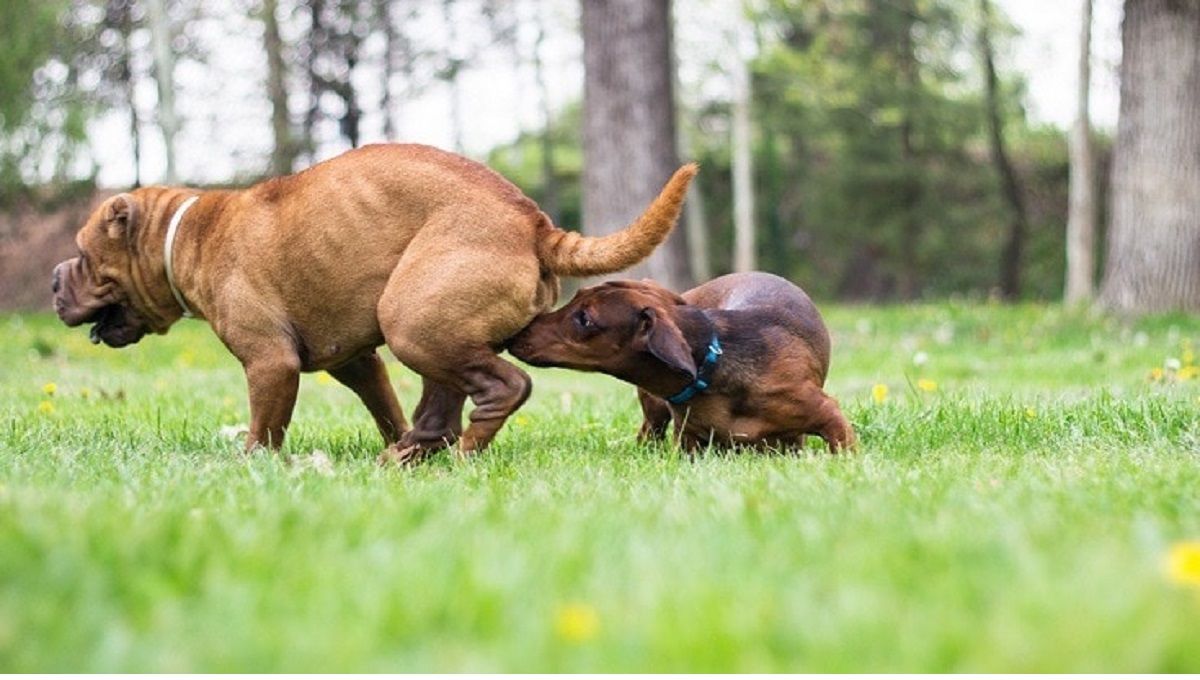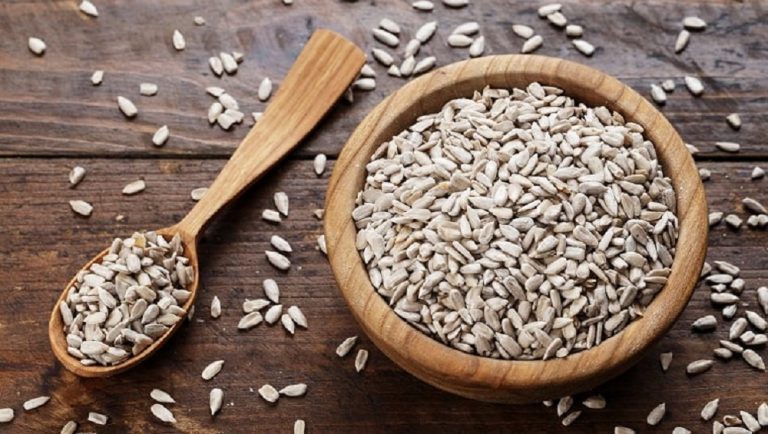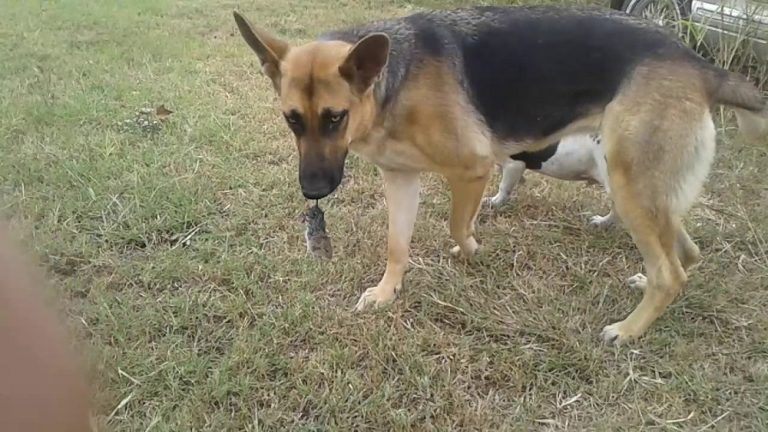Do Unneutered Dogs Smell More?
Unneutered dogs can emit a stronger odor than their neutered counterparts. This musky scent is due to hormones and is more noticeable in intact males.
As pet owners, we often become familiar with the various scents our canine companions produce.
An unneutered dog, commonly referred to as an intact male, often carries a distinct musky smell that sets him apart from neutered dogs.
This particular odor, rooted in hormonal differences, serves a purpose in the animal kingdom, aiding in marking territory and signaling reproductive status.
As responsible pet owners looking to maintain a pleasant household environment, understanding and managing these natural scents is a common concern.
With attention to hygiene and considering the option of neutering, dog owners can mitigate these odors and enjoy a fresher-smelling companion.
Addressing this aspect of dog ownership contributes not only to a more harmonious living situation but also to the well-being of the pet.
The Science Behind Dog’s Smell
Dogs have a distinct scent. This odor is thanks to oil in their fur and sweat from their paws. Your dog’s unique smell can vary. It’s like a personal fingerprint. For unneutered dogs, their scent is even more special.
How Unneutered Dogs’ Smell Differs
Unneutered dogs have hormones such as testosterone. These hormones change their body odor. Male dogs not neutered have a stronger scent. This is to attract mates. It’s also to mark their territory.
Factors Contributing To Unneutered Dogs’ Odor
- Hormones: Natural chemicals in their body can cause more powerful smells.
- Marking behavior: Unneutered dogs often mark with urine. It has a pungent smell.
- Glands: They have scent glands. These glands work more when they’re unneutered.
- Diet and health: What they eat affects their smell. So does their health.
- Cleaning habits: Dogs clean less when focused on mating.
Behavioral Implications
Unneutered dogs often display unique behaviors. This is due to their natural instincts. We explore how this can affect their actions.
Effect On Mating Behavior
Unneutered dogs show strong mating drives. During mating periods, male dogs become more restless. These dogs might attempt to escape to find a mate.
They can also become aggressive if denied the chance to mate. Owners must be aware of these behaviors. It is crucial for managing unneutered dogs.
Impact On Territorial Marking
Marking territory is a common trait in unneutered dogs. This often results in a stronger odor. The scent signals other males. It communicates the presence of a potential competitor. The smell warns off other dogs. It also attracts females.
This can lead to unwanted attention from other dogs in the vicinity.
- Indoor marking: Owners might notice more frequent marking inside the house.
- Outdoor marking: Unneutered dogs intensify their marking outside, particularly where other dogs have marked.
Health Considerations
When we consider unneutered dogs, their health and scent go paw in paw. Unneutered canines may emit stronger odors due to specific health issues and natural behaviors.
It’s vital we sniff out the truth about potential health risks and their link to unpleasant smells.
Link Between Odor And Health Issues
Some unneutered dogs can develop smellier odors over time. Beyond the natural musky scent related to testosterone, certain health problems can cause a dog’s smell to intensify:
- Infections: Such as skin or ear infections, which can produce a foul odor.
- Anal glands: Impacted anal glands can create a very nasty smell.
- Tooth decay: Oral hygiene issues can lead to bad breath and odors.
- Urinary tract: Diseases can result in foul-smelling urine.
Avoiding these issues is crucial. Regular check-ups with a vet help ensure a dog’s robust health and better scent.
Benefits Of Neutering In Managing Odor
Neutering offers benefits that extend to managing your dog’s odor:
- Reduces aggression: Less aggression means less stress and possibly less sweat and odor.
- Decreased marking: Neutered dogs mark less, which helps keep smells at bay.
- Lowers health risks: It can prevent conditions that may cause unpleasant smells.
Neutering your dog can lead to a happier, healthier, and better-smelling furry friend. It’s a step worth considering for any pet parent.
Managing Odor
Odors from unneutered dogs are common, yet managing them is possible. Proper care reduces unwanted scents significantly. Explore tips to keep your furry friend smelling fresh.
Grooming And Hygiene Practices
Regular grooming is key. It keeps your pooch clean and odor-free. Brush your dog often. It removes dirt and spreads natural oils. Bathing your dog is essential too.
Grooming essentials:
- Choose the right shampoo: Select a pet-friendly option that neutralizes odors.
- Ear cleaning: Ears can hold odors. Clean them with a vet-approved solution.
- Brushing teeth: Oral hygiene affects overall scent. Use canine toothpaste for fresh breath.
- Nail trimming: This prevents the build-up of dirt and bacteria.
- Cleaning bedding and toys: Wash these regularly to prevent stale smells.
Environmental Considerations
Create a clean living space for your canine. Ensure good ventilation in your dog’s area. Use air purifiers if needed. They can help filter out pet odors.
| Area | Action | Frequency |
|---|---|---|
| Living Space | Clean and disinfect | Weekly |
| Bedding | Wash with fragrance-free detergent | Bi-weekly |
| Feeding Area | Wipe and sanitize | Daily |
| Toys | Soak in dog-safe cleaning solution | Monthly |
Remember, clean outdoor spaces too. Pick up and dispose of waste promptly. Use enzymatic cleaners for accidents inside the house. They break down odors organically.
Concluding Thoughts
Our beloved four-legged friends often become the center of attention regarding their care and well-being.
A matter that might seem trivial to some, the scent of an unneutered dog, carries weight in the discourse of pet responsibility. Let’s sift through the key elements that wrap up this topic.
The Role Of Responsible Pet Ownership
Ensuring your pet is well-cared-for involves various responsibilities. Neutering is a decision that impacts a dog’s health and behavior.
It can reduce odors associated with hormones in unneutered canines. Responsible pet ownership encompasses:
- Regular baths and grooming to keep your dog clean.
- Keeping up-to-date with vaccinations and vet visits.
- Understanding your pet’s needs, including diet and exercise.
Consulting A Veterinarian For Advice
The best course of action when it comes to your dog’s health and smell is to seek advice from a vet. A vet will provide:
- Insight into the benefits of neutering for your dog’s breed.
- Tips to manage any odor while you decide on neutering.
- Recommendations for appropriate grooming products.
Ultimately, a veterinarian is a trusted guide for a healthy, happy pet.
Frequently Asked Questions
Do Unneutered Male Dogs Smell Bad?
Unneutered male dogs may have a stronger odor due to their hormones. Territory marking and natural secretions can contribute to this smell. Regular grooming can help manage it.
Does Neutering A Dog Reduce Smell?
Yes, neutering a dog can reduce its odor. The removal of sexual organs decreases hormone-driven behaviors and associated smells.
Do Intact Male Dogs Sniff More?
Intact male dogs often sniff more due to their instinct to detect and track female reproductive status and mark territory.
What Are The Problems With Intact Male Dogs?
Intact male dogs often exhibit territorial marking, aggression, and roaming behaviors. They are also at higher risk for testicular cancer and prostate issues.
Do Unneutered Male Dogs Have A Stronger Odor?
Unneutered male dogs often possess a more pungent scent due to hormones influencing their bodily functions and marking behaviors.
Conclusion
Navigating the challenges of dog ownership includes addressing odors. Unneutered dogs can indeed have a distinctive smell due to their natural hormones.
Responsible pet care, regular grooming, and considering neutering can mitigate this issue. Remember, a fresh-smelling pup makes for a happier home and a healthier pet.




